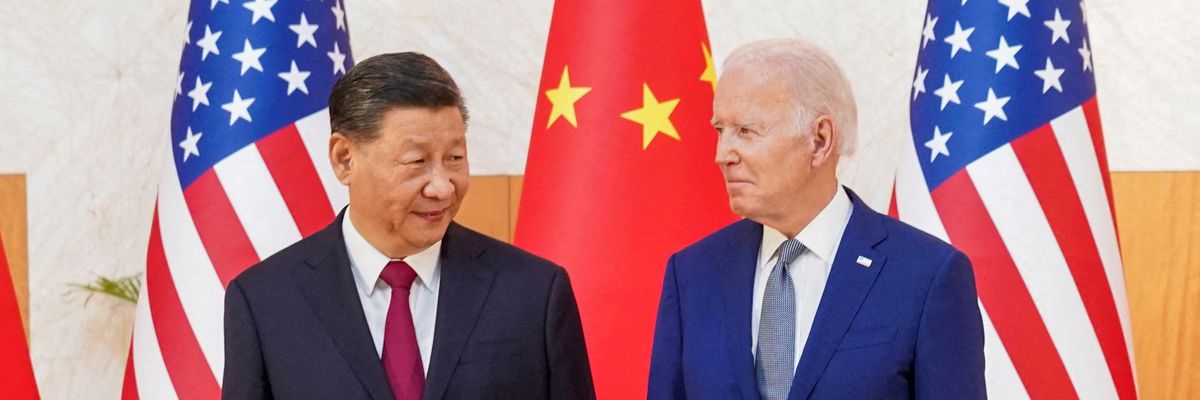Yesterday, the New York Times published a guest essay by Craig Singleton, a fellow at the Foundation for Defense of Democracies, entitled “China’s Military is Going Global.” Singleton argues that Beijing is well on its way to building a globe-spanning network of “strategic strong points along China’s major trade, energy, and resource routes” that pose a dire military threat to the United States.
Allegedly using the structure of the Chinese Belt and Road Initiative of commercial infrastructure projects, Beijing’s supposedly new “under the radar” strategy is seen as directly challenging Washington’s ability to carry out critical overseas military missions, including the defense of Taiwan.
In response to this expanding threat, Singleton calls for Washington to devise a strategy designed to “pre-emptively” neutralize China’s moves, including “incentives or punishments” directed at host governments.
It is surprising that the New York Times saw fit to publish such an essay, since it is replete with distortions, exaggerations, and speculations. There is no question that China’s overseas military-related activities merits close examination, especially when they take place in sensitive areas. But such an examination requires a careful parsing of actual facts, with clear distinctions made between proposed plans, actual undertakings, commercial versus military (and non-military security) purposes, and the likely military benefits for China that might ensue from a particular location or operation.
Instead of observing such requirements, Singleton plays fast and loose with the evidence, subtly caveating his statements with weasel words like “might,” “may,“ “could,” “suggests,” “suspected,” etc. Nonetheless, almost every conceivable possible, current, or emerging overseas Chinese commercial, scientific, or security “presence” is labeled as part of a deliberate, coordinated, military-centered strategy to “reshape the global military landscape” in Beijing’s favor and hence to threaten the U.S.
In reality, China has thus far established only one actual, operating overseas military base, on the horn of Africa, in Djibouti, and is probably establishing a naval facility in Cambodia. But there are real limits to how far China can go in duplicating such places. As Isaac Kardon of the Carnegie Endowment has pointed out, China has no formal military alliances (beyond the dubious case of North Korea) and is unlikely to acquire any in the foreseeable future, a fact that imposes major constraints on its ability to establish serious military bases. Few if any countries wish to commit to housing full-fledged, sizeable military facilities that could project Chinese military power across their region and, in the process, invite an American response.
Moreover, many of the actual security-related facilities that Singleton employs as evidence for his argument serve functions other than militarily threatening the United States, such as anti-piracy missions, UN peace-keeping rotations, non-combatant evacuation operations in an emergency, or the protection of nearby investments. And their ability to evolve beyond such functions is likely to remain highly limited.
Most recipient states want Chinese commerce and investment above all else. Indeed, many of the supposed new Chinese bases or proto bases identified by Singleton consist primarily of a commercial or civilian scientific presence, some with only a vague potential for military use. A few existing commercial facilities (such as in the UAE) might acquire limited military functions, but in many cases this remains unclear. One can argue that such commercial locations do serve a kind of strategic purpose, but as part of Beijing’s efforts to become a major commercial and scientific/technological power, not to directly threaten U.S. global military dominance.
In addition, even if a clearer military function were to emerge in many of China’s overseas facilities, it is far from clear that it would in most cases provide Beijing with the kind of daunting strategic benefit that Singleton alleges. For example, some analysts of the facility in Cambodia have argued that it will provide few new operational advantages for the PLA.
In truth, Singleton’s argument is an updated and expanded version of the so-called “string of pearls” idea that appeared many years ago. Originating with an American corporation, the concept sought to link together some of China’s overseas activities in Southeast Asia and along the Indian Ocean to the Middle East to form a grand Chinese strategic move to dominate the region militarily and politically. As with the present version, the reality fell far short, usually for similar reasons.
Finally, it is troubling that Singleton recommends that Washington should adopt both incentives and coercive means to preemptively neutralize China’s allegedly nefarious overseas activities. If applied to most of the existing examples he provides of these activities, such an effort could easily backfire, as target countries interpret Washington’s behavior as an attempt to undermine what they regard as legitimate commercial and scientific transactions with China.
China’s expanding overseas commercial, scientific, and security presence requires close, careful examination, no question. Unfortunately, this essay does not offer such analysis. Indeed, by publishing it, the New York Times has more likely provoked an even greater level of threat inflation than already exists in Washington and elsewhere.














